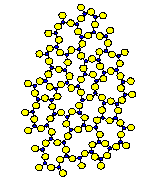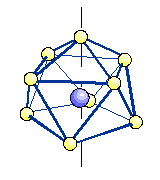 Understanding
the structure-property relations of glass forming systems is the prerequisite
for what might be called the chemical tailoring of these materials
to meet predefined physical properties. Due to the absence of long-range
order, which is characteristic for the vitreous state, there is not a single
experimental technique which could produce a direct mapping of the glass
network structure. Therefore the elucidation of glass structures has become
a major enterprise involving many different experimental and theoretical
methods which yield different, often complementary, information which can
be combined to a structural model of a certain glass system.
Understanding
the structure-property relations of glass forming systems is the prerequisite
for what might be called the chemical tailoring of these materials
to meet predefined physical properties. Due to the absence of long-range
order, which is characteristic for the vitreous state, there is not a single
experimental technique which could produce a direct mapping of the glass
network structure. Therefore the elucidation of glass structures has become
a major enterprise involving many different experimental and theoretical
methods which yield different, often complementary, information which can
be combined to a structural model of a certain glass system.
Further information:
Introduction to the fundamental concepts of glass structure in general
and to the structures of some important glass systems.
 The research group
Solid State Spectroscopy and Magnetochemistry in Material Science
investigates composition
dependent changes in the optical spectra of glasses doped with small amounts
of rare-earth ions and correlates the trends observed in the optical spectra
with the structural changes induced in the host glass by composition variations.
Hence the dopant ions are considered as structural probes in the
respective host material. Presently the rare-earth ions europium and neodymium
are used in glasses of the ternary sodium borosilicate system.
Part of this work is covered by the research project P10713-CHE entitled
Exchange Interaction in Glasses and Zeolites,
which was granted by the Austrian Science Foundation
FWF
to
The research group
Solid State Spectroscopy and Magnetochemistry in Material Science
investigates composition
dependent changes in the optical spectra of glasses doped with small amounts
of rare-earth ions and correlates the trends observed in the optical spectra
with the structural changes induced in the host glass by composition variations.
Hence the dopant ions are considered as structural probes in the
respective host material. Presently the rare-earth ions europium and neodymium
are used in glasses of the ternary sodium borosilicate system.
Part of this work is covered by the research project P10713-CHE entitled
Exchange Interaction in Glasses and Zeolites,
which was granted by the Austrian Science Foundation
FWF
to Further information: Introduction and a summary of our results.